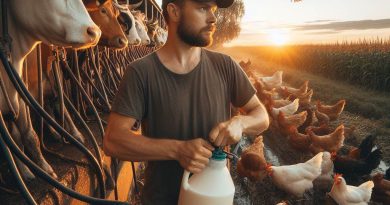Women in Canadian Agriculture: A Profile
Last Updated on January 13, 2024
Introduction
Welcome to the exploration of “Women in Canadian Agriculture: A Profile.”
In this section, we uncover the often underestimated and vital contributions of women in the agricultural landscape.
As we delve into their diverse roles, challenges, and successes, it becomes evident that women play a central part in shaping the dynamism and diversity of the Canadian farming sector.
Highlighting the significance of acknowledging these contributions, this section seeks to bring attention to the often unsung heroes of agriculture.
Their resilience, innovation, and dedication are integral to the industry’s evolution.
Recognizing the multifaceted roles women play in agriculture is essential for a comprehensive understanding of the sector’s complexities.
Our purpose is clear – to celebrate and showcase the stories of women who contribute significantly to Canadian agriculture.
Through their experiences, we aim to foster awareness, appreciation, and recognition of the indispensable role women play in steering the course of farming in Canada.
Join us on this enlightening journey, where the narratives of women in agriculture come to life, painting a rich and vibrant portrait of their essential presence in this critical sector.
Statistics on Women in Canadian Agriculture
In terms of representation, women make up about 28% of the agricultural industry in Canada.
Over the past decade, there has been a notable growth in the number of women entering the field.
Disparities or challenges faced by women in this field
However, despite this growth, women still face various disparities and challenges in agriculture.
One of the main challenges faced by women in Canadian agriculture is the gender wage gap.
On average, women in the industry earn about 30% less than their male counterparts.
This wage gap not only affects women’s financial stability but also perpetuates gender inequality within the sector.
Furthermore, women in Canadian agriculture often face limited access to resources and support.
Many agricultural organizations and programs tend to be male-dominated, making it difficult for women to access opportunities.
Lack of representation and mentorship also contribute to the challenges women face in advancing their careers.
Additionally, women in agriculture often encounter societal stereotypes and biases.
There is often an assumption that certain agricultural tasks are better suited for men, leading to limited opportunities for women.
Breaking these stereotypes and challenging societal norms is crucial for promoting gender equality in the field.
Despite these challenges, there have been positive changes and initiatives aimed at promoting women in Canadian agriculture.
Various organizations are working towards increasing representation and providing support for women in the industry.
Initiatives such as mentorship programs and educational campaigns aim to empower women and address the disparities they face.
Moreover, women are taking on leadership roles and advocating for their rights within the agricultural sector.
By actively participating in industry associations and organizations, women are making their voices heard and pushing for change.
Therefore, the representation of women in Canadian agriculture has shown growth and changes in the past decade.
However, disparities and challenges, such as the gender wage gap and limited access to resources, still persist.
It is essential for the industry to continue promoting gender equality and providing support for women in agriculture.
Read: How to Start a Career in Fishing in Canada
Profiles of Successful Women in Canadian Agriculture
In the world of Canadian agriculture, there are numerous inspiring women who have paved the way and made significant contributions to the field.
These women have overcome challenges and achieved remarkable success, setting an example for future generations.
Let’s take a closer look at a few of these incredible women:
Mary Robinson
Mary Robinson, hailing from Ontario, is a prominent figure in Canadian agriculture.
With a background in farming, she has dedicated her life to improving agriculture practices.
Robinson has successfully implemented sustainable farming techniques, enhancing productivity while minimizing environmental impact.
Her innovative approach has earned her several awards and recognition within the industry.
Throughout her career, Mary Robinson faced numerous challenges, including limited resources and skepticism from traditional agriculture practitioners.
However, she overcame these hurdles by conducting extensive research and demonstrating the tangible benefits of sustainable farming techniques.
Today, she acts as a mentor to aspiring female farmers and continues to advocate for sustainable practices in Canadian agriculture.
Sarah Palmer
Sarah Palmer, a native of Alberta, has made remarkable contributions in the field of agricultural technology.
With a degree in computer science, she recognized the potential for technology to revolutionize farming practices.
Palmer developed an innovative software solution that optimizes crop management, resulting in increased yields and reduced costs for farmers across the country.
In her journey, Sarah Palmer encountered resistance from traditional farmers who were skeptical of using technology in agriculture.
However, she persisted and successfully demonstrated the benefits of her software, leading to widespread adoption in the industry.
Palmer’s software has revolutionized how farmers manage their crops, making her a trailblazer in Canadian agricultural technology.
Eva Thompson
Eva Thompson, originally from Saskatchewan, has made significant contributions to the field of agricultural research.
With a Ph.D. in agricultural science, Thompson has dedicated her life to developing innovative farming practices and improving crop quality.
Her research has directly impacted the agricultural industry, leading to increased efficiency and productivity.
Despite facing gender bias in the field of agricultural research, Eva Thompson persevered and became a pioneer in her field.
Her groundbreaking research has earned her numerous accolades, and she continues to inspire young women to pursue careers in agricultural science.
Thompson’s contributions have propelled Canadian agriculture to new heights.
These profiles provide a glimpse into the lives of just a few of the remarkable women making a difference in Canadian agriculture.
Mary Robinson, Sarah Palmer, and Eva Thompson are prime examples of how passion, innovation, and determination can lead to significant achievements in the industry.
These women have not only succeeded in their respective fields but have also paved the way for future generations of female farmers, researchers, and innovators.
Their contributions to sustainable farming practices, agricultural technology, and research have transformed Canadian agriculture and continue to inspire others to follow in their footsteps.
Through their achievements, these women prove that gender should never be a barrier to success in any field, including agriculture.
With their inspiring stories, they encourage women across Canada to pursue their passions and make their mark on the future of Canadian agriculture.
Read: The Economic Impact of Logging in Canada
Opportunities and Support for Women in Canadian Agriculture
Many programs and initiatives exist to support women in agriculture and help them succeed.
Various scholarships, grants, and mentorship programs are available exclusively for women in agriculture.
Several organizations are dedicated to empowering women in the field of agriculture.
Programs and initiatives
- The Advancing Women in Agriculture Conference: A yearly event that provides resources and networking opportunities for women in the industry.
- The Women in Agriculture Mentoring Program: A program that pairs experienced female farmers with those looking to gain knowledge and skills in the field.
- The Women in Agriculture Development Program: An initiative that offers support and training to women looking to start and run their own farm or agri-food business.
- The Canadian Agricultural Partnership: A national initiative that provides funding and assistance for projects that promote women in agriculture.
Scholarships, grants, and mentorship programs
- The Canadian Agri-Business Education Foundation: This organization offers scholarships to women pursuing education and careers in agricultural business.
- The Canadian Agricultural Women’s Association: They offer scholarships to women in agriculture to help them pursue post-secondary education in related fields.
- The Farm Credit Canada Rosemary Davis Memorial Scholarship: A scholarship that supports women studying agriculture or agri-food sciences.
- The CIBC Women in Farm Leadership Award: An award that recognizes women who have made significant contributions to the agriculture sector.
Organizations supporting women in agriculture
- Agriculture for Life: Their programs focus on educating and inspiring young women to pursue careers in agriculture.
- Canadian Women in Food: This organization empowers women in the agri-food industry through networking, mentorship, and skill development.
- Ag Women’s Network: They provide a platform for women working in agriculture to connect, learn, and grow professionally.
- Agricultural Excellence Conference: This annual conference hosts sessions and workshops that cater to women in agriculture.
Most importantly, women in Canadian agriculture have access to numerous opportunities and support systems.
Various programs, scholarships, grants, and organizations are dedicated to their success, empowering them to thrive in the field.
Read: Fishery Conservation Efforts in Canada

Challenges Faced by Women in Canadian Agriculture
Women have made significant contributions to the Canadian cultivation industry, but they still face numerous challenges and discrimination based on their gender.
It is important to shine a light on these issues to bring about positive change and promote gender equality in the sector.
Gender-Based Challenges and Discrimination
- Women in Canadian agriculture often face gender-based challenges and discrimination.
- They may be underestimated or not taken seriously due to preconceived notions.
- There is a lack of recognition for the skills and abilities of women in this field.
- Access to capital, loans, and grants may be more difficult for women compared to men.
- Women may encounter limited opportunities for training and professional development.
Representation Issues and Biases
- Representation of women in decision-making roles within the agricultural industry is limited.
- There is a lack of female role models and mentors for women entering the sector.
- Biases against women may result in unequal pay and limited career advancement.
- Women may face stereotypes that farming is a male-dominated field, discouraging their participation.
- Cultural and societal expectations may place additional barriers for women pursuing careers in agriculture.
Work-Life Balance Challenges
- Women in cultivation often struggle to find a healthy work-life balance.
- The demands of running a farm or agricultural business can be physically and emotionally taxing.
- Juggling family responsibilities with the demands of the job is a constant challenge.
- Long and irregular working hours can have a significant impact on personal relationships and overall well-being.
- Lack of support systems and resources further exacerbate work-life balance challenges for women in cultivation.
Addressing the Challenges
To address these challenges, it is crucial to create a more inclusive and supportive environment for women in Canadian cultivation:
- Implement policies and initiatives that promote gender equality and remove biases in the industry.
- Encourage more female representation in leadership and decision-making positions.
- Provide equal access to training programs and resources for men and women in agriculture.
- Support networks and mentorship opportunities to empower women and foster their professional growth.
- Recognize the contributions and achievements of women in agriculture to break stereotypes and biases.
By actively addressing these challenges, the Canadian agriculture industry can become a more diverse, inclusive, and prosperous sector where women have equal opportunities for success.
Read: Safety First: Logging Workers’ Guidelines
Success Stories of Women in Canadian Agriculture
Over the years, numerous women in Canadian agriculture have shown incredible determination and resilience in overcoming various challenges.
Their success stories serve as an inspiration for many aspiring women in this field.
- Emma Thompson: Emma, a young farmer from Alberta, faced skepticism from her male counterparts. She persevered and now owns a highly successful organic farm.
- Marie Leblanc: Marie, a single mother, turned her family farm into a thriving business by introducing innovative practices and diversifying her crops.
- Linda Chen: Linda, an immigrant from China, faced language barriers and cultural differences. However, her dedication and hard work helped her become a respected dairy farmer.
These women succeeded by implementing effective strategies and utilizing available resources.
Strategies and Resources for Women in Canadian Agriculture
Women in Canadian cultivation can benefit from several strategies and resources specifically tailored to support their success and growth.
- Mentorship programs: Connecting with experienced mentors can provide valuable guidance and advice, helping women navigate the challenges they may face.
- Networking opportunities: Attending industry events and joining farmer associations can help women establish connections and access support networks.
- Financial assistance: Various grants and loans are available to women in cultivation, enabling them to invest in their farms and businesses.
- Education and training: Pursuing agricultural education and training programs equips women with the necessary knowledge and skills to succeed in this field.
- Online platforms and communities: Engaging with online platforms and communities allows women to connect with and learn from other industry professionals.
With these strategies and resources, women can overcome challenges and thrive in Canadian agriculture.
Tips and Advice for Aspiring Women in Agriculture
For women aspiring to pursue a career in Canadian agriculture, here are some important tips and advice:
- Follow your passion: Choose a specific aspect of agriculture that you are truly passionate about, as this passion will drive you to succeed.
- Be confident: Believe in your abilities and value as a woman in agriculture. Confidence helps overcome obstacles and gain respect among peers.
- Never stop learning: Continuously educate yourself about new farming techniques, industry trends, and advancements to stay ahead in this dynamic field.
- Build a strong support system: Surround yourself with like-minded individuals who support and encourage your agricultural endeavors.
- Embrace challenges: View challenges as opportunities for growth and learning. They will make you a stronger and more resilient farmer.
Remember, success in Canadian agriculture is within reach for women who are determined, resourceful, and willing to overcome any obstacle that comes their way.
Conclusion
Our exploration of “Women in Canadian Agriculture: A Profile” unveiled their pivotal roles, challenges, and successes.
- Diverse Contributions: Women contribute significantly to the dynamism and diversity of Canadian agriculture.
- Unsung Heroes: Acknowledging their efforts is vital for understanding the industry comprehensively.
- Resilience and Innovation: Women showcase resilience, innovation, and dedication crucial for the sector’s evolution.
Reiterating the significance, it is imperative to:
- Recognize: Acknowledge the indispensable role women play in steering the course of Canadian farming.
- Support: Advocate for policies and initiatives that support and empower women in agricultural endeavors.
- Empower: Encourage readers to actively contribute to the ongoing empowerment of women in the agricultural sector.
By recognizing, supporting, and empowering women in Canadian agriculture, we collectively contribute to a more vibrant, inclusive, and sustainable future for the industry.
Let’s continue championing the women who shape the landscape of Canadian farming.


